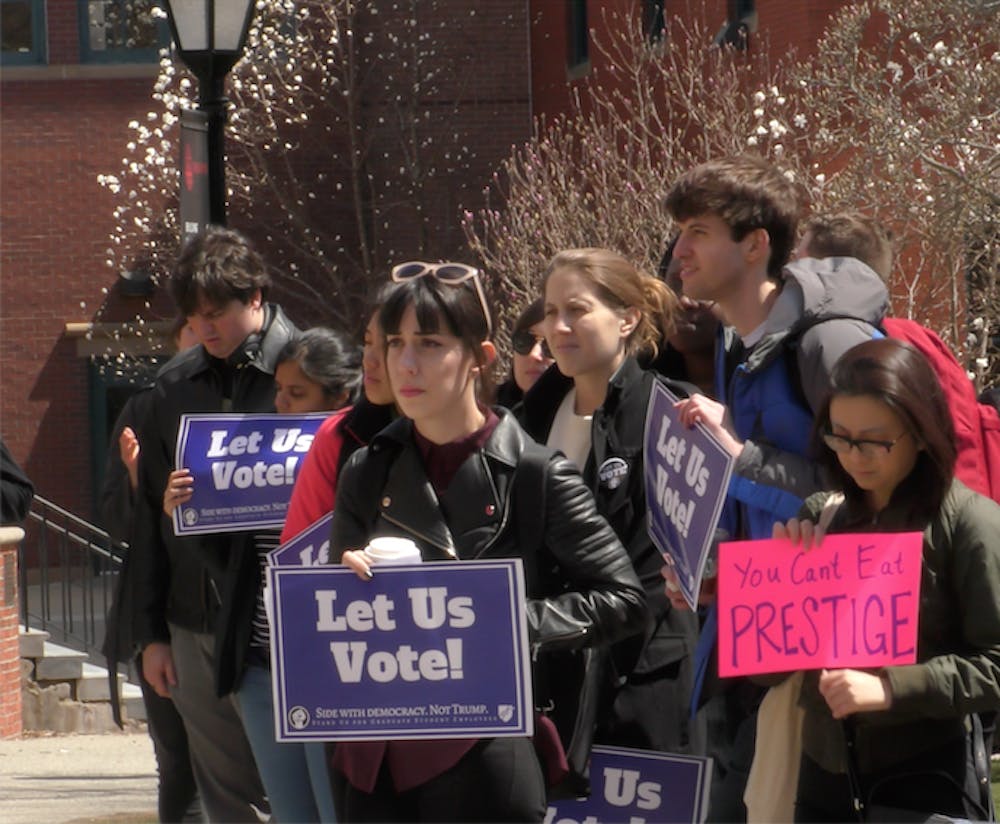Stand Up for Graduate Student Employees and Brown Student Labor Alliance held a rally Wednesday afternoon on the Main Green, asking the University to approve a pre-election agreement that would lead to an election on unionization. The Let Us Vote Rally walked and chanted past department buildings on Waterman Street before returning to the Green for a final march through University Hall, where SUGSE delivered a pre-election proposal to the Office of the Provost.
The rally called upon the University to allow a neutral, independent group to administer the election — such as the American Arbitration Association — and to recognize master’s students in the unionizing process. In past weeks, the University’s pre-election conditions excluded master’s students who conducted research and taught, said Marley-Vincent Lindsey GS, a member of SUGSE, during the rally.
SUGSE members believe that coming to a pre-election agreement with the University is the only available path to unionization since filing a petition with the National Labor Relations Board would leave the decision to a board mainly composed of members nominated by President Trump, SUGSE member Hilary Rasch GS told The Herald. This Trump-era board has already rolled back labor-friendly rulings made during former president Barack Obama’s administration, The Herald previously reported.
In response to the rally, the administration noted “no permission from Brown is required for graduate students to take the steps for an election,” Director of News and Editorial Development Brian Clark wrote in an email to The Herald. The University maintains that position, as stated in a letter Locke wrote to graduate students April 13.
The University continues to work with graduate students and remains hopeful on reaching a pre-election agreement, but it will “support the right of graduate students to vote” if an election takes place without an agreement, according to the letter.
While a pre-election agreement is not required to hold a vote, there is no way of ensuring the University will recognize its outcome, SUGSE member Malay Firoz GS told The Herald, adding that this has occurred at other universities across the country. “We want to learn from their experience,” Firoz said.
“In every single draft (of the pre-election agreement) that we’ve gotten back, the administration has made it very clear that they want to go through the NLRB, which is going to disenfranchise graduate students, not just at Brown, but across the country,” Lubabah Chowdhury GS, a member of SUGSE, told The Herald. She added that graduate student groups across the country have rescinded their petitions to avoid going through the NLRB, which may overturn their right to unionize.
Doctoral, master’s and undergraduate students shared reasons why the collective bargaining capability of unionization is necessary. Julie Skarha GS drew attention to the drop from 50 percent to 10 percent in master’s student tuition remission — which waives portions of the tuition — over the past few years. She also pointed out the pay gap between master’s students and their doctoral counterparts — who are paid two-thirds more and often for the same work — and added that Brown’s name “looks good on paper,” but “you can’t eat prestige.”
Sierra Kaufman GS spoke of how a union would allow students to voice their concerns without retribution. Having grown up on the Shinnecock Indian Reservation, Kaufman encountered a “lack of cultural awareness and diversity” that was “hard to cope with” when she got to Brown.
“As a member of such a small minority, all of my concerns… can be traced directly back (to me) and leave me open for retaliation on my academic career,” Kaufman said, adding that banding together will “collectively allow (students) to be heard and acknowledged.”
Representatives from local unions such as United Service and Allied Workers of Rhode Island, Graduate Assistants United of the University of Rhode Island and Rhode Island Federation of Teachers and Health Professionals spoke at the rally to show solidarity with SUGSE’s efforts to unionize.
State Rep. Aaron Regunberg ’12 also spoke at the rally and encouraged community members to ensure the University makes elections a “fair and neutral process.” The process of unionization “cannot be done through (the NLRB board of) the Trump administration” because it is “at the forefront” of assaults against middle class labor for the benefit of “millionaires and billionaires,” Regunberg told the crowd.
Firoz says that “going to an election” is the immediate next step after solidifying a pre-election agreement with the administration and building up “enough solidarity amongst students.”
A vote is expected to be held next year, Firoz said.
“Brown on the one hand is a university that … solicits student input … (and) genuinely wants to know what we think,” Firoz said during the rally. “And yet it also wants a paternalistic relationship with us where they grant us with their good intentions and discretion. … They grant us things that should be ours by right,” he added.





